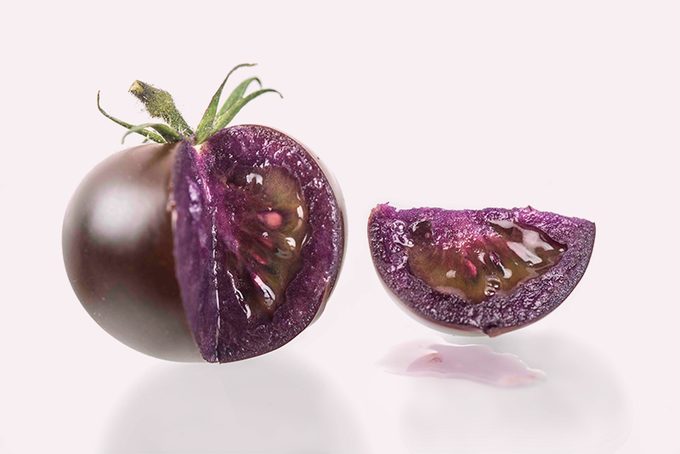In the world of good health, nutritionists often advise to “eat the rainbow,” meaning that varying important vitamins and minerals are found all across the color scale of fruits and vegetables. In order to benefit from a multitude of these nutrients, we are told to incorporate as many colorful foods into our diets as we can. Well, it seems we’ll soon have another option in the rather lonely purple category.
The USDA has just recently approved a brand new, genetically modified tomato that’s due to hit the produce section next year. This new variety will have the same sweet tomato flavor we love, the same plump, juicy texture, but with added benefits of a longer shelf life and extra nutritional value. Oh, also, it’s purple.

We know what you might be thinking? Is this just some silly trend, like the blue, teal, green, and (yes) purple ketchups that tried to compete with the classic red condiment?
While the color is certainly lovely, purple is more than just a pretty face. The royal color itself actually comes with tons of health benefits. British biochemist Cathie Martin worked on pigment production in flowers for over two decades, and found that the purple-hued pigments called anthocyanins are something of an antioxidant Superhero. Found in foods like blueberries, blackberries, and eggplant, anthocyanins have shown to help protect against certain cancers, diabetes, and cardiovascular disease. By infusing tomatoes with this pigment, Martin and her team have come up with what will undoubtedly be the next darling of the health food world. According to a 2008 study conducted by Martin and her team, cancer-prone mice who were fed the purple tomatoes lived about 30% longer than those who ate a regular variety. That’s pretty remarkable.
As for their flavor, purple tomatoes are (when blindfolded) indistinguishable from other tomatoes and taste every bit as delicious. So if your main concern is the best-tasting tomatoes for your summertime recipes, worry not— these purple little beauties will take center stage at your picnic table next year.



